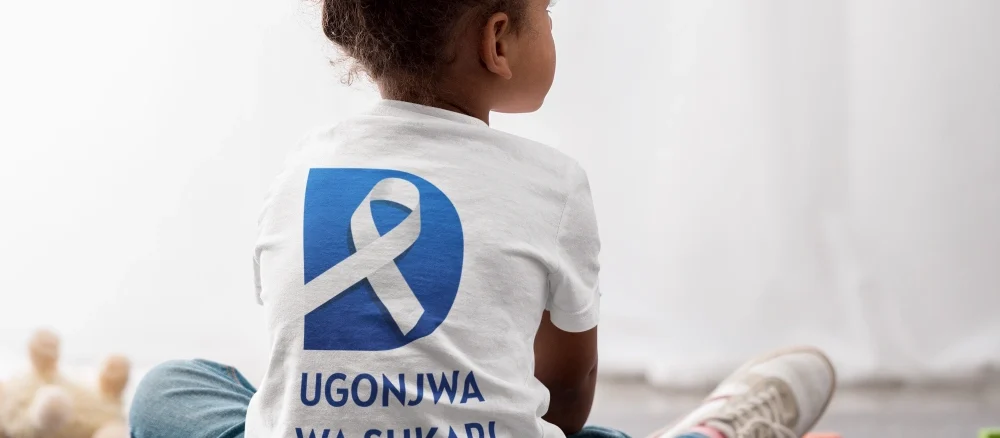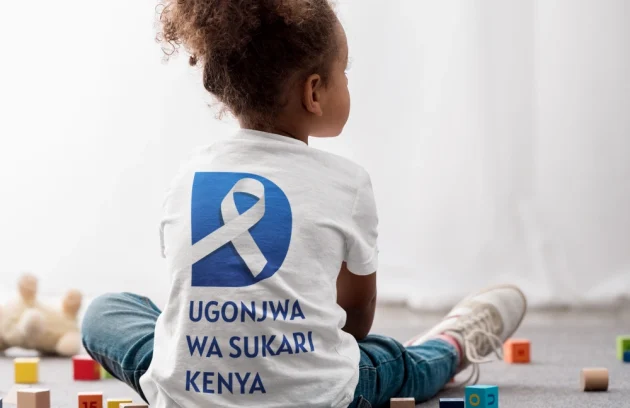- September 26, 2024
- Diabetes Kenya
- Comment: 0
- Children and diabetes
Symptoms of Diabetes in Children
Diabetes in children is a growing concern worldwide, including in Kenya. It’s essential for parents and caregivers to recognize the signs early so they can seek immediate medical help. Delaying treatment can lead to serious complications. Below are the key symptoms of diabetes in children, along with guidance tailored to the Kenyan context.
Symptoms of Type 1 Diabetes in Children
Type 1 diabetes is the most common type of diabetes in children. It can develop quickly, and it’s crucial to recognize the signs early. The most common symptoms include:

Toilet Issues
If your child suddenly starts wetting the bed after being dry for a while, or you notice heavier nappies in babies, this could be a warning sign. Frequent trips to the toilet, especially during the night, are also common.

Increased Thirst
Your child may ask for water more frequently or finish drinks quickly. They might be unable to quench their thirst no matter how much they drink.

Tiredness
Look out for signs of fatigue. Your child may seem more tired than usual, avoid playing as much, or have less energy for sports and school activities.

Weight Loss
A child with type 1 diabetes may lose weight rapidly or appear thinner than usual, even if they have a healthy appetite.
You may also notice that your child is more prone to infections than before. These symptoms typically develop quickly, within days or weeks, and require urgent medical attention.
Symptoms of Type 2 Diabetes in Children
Though type 1 diabetes is more common in children, cases of type 2 diabetes are increasing, especially in urban areas of Kenya. Type 2 diabetes often develops more slowly, with symptoms appearing over weeks or months. The symptoms include:

Frequent Urination
Similar to type 1 diabetes, children with type 2 diabetes may need to urinate more often, including during the night.

Increased Thirst
Children may drink more water or other fluids but still feel thirsty.

Fatigue
Look for signs that your child is too tired to engage in activities they once enjoyed, such as playing or attending school.

Weight Changes
Unlike type 1, children with type 2 diabetes might gain weight or maintain their weight but experience other symptoms.
In Kenya, children with a family history of diabetes, certain ethnic backgrounds, or those who are overweight are at a higher risk of developing type 2 diabetes. Recognizing these symptoms early can lead to a timely diagnosis and prevent complications.
What to Do if You Think Your Child Has Diabetes
If you observe any of the symptoms mentioned above, it’s essential to act quickly. Visit your nearest health facility or paediatrician and request a blood glucose test. This quick and simple test, often done by a finger prick, can help determine if your child’s blood sugar levels are too high. If elevated, your child may be referred to a specialist diabetes team or hospital for further tests and diagnosis.
In many rural areas of Kenya, diabetes screening facilities might be limited, but you should insist on getting your child tested, especially if they show signs of extreme thirst, fatigue, or rapid weight loss.
Risks of Missing a Diabetes Diagnosis in Children
Unfortunately, many children in Kenya and other parts of the world are not diagnosed with type 1 diabetes until they are in diabetic ketoacidosis (DKA), a severe condition that can be life-threatening. DKA occurs when the body runs out of insulin, leading to dangerously high blood sugar levels and the build-up of acids (ketones) in the blood.
For children with undiagnosed type 2 diabetes, high blood sugar levels can lead to long-term damage to the body, especially if they become sick or develop infections. In rare cases, these children may also develop DKA or a condition called hyperosmolar hyperglycaemic state (HHS).
Support for Families with Children Diagnosed with Diabetes in Kenya
Once a child is diagnosed with diabetes, managing the condition can be challenging, but help is available. Local healthcare providers, diabetes clinics, and support networks can offer guidance on managing your child’s condition, including medication, insulin injections, and lifestyle adjustments. Ensuring access to proper nutrition, regular blood sugar monitoring, and follow-up care is essential for managing diabetes effectively.

By recognizing the signs early and seeking medical advice, families in Kenya can take control of diabetes and provide the best care for their children. Remember, early diagnosis and proper management are key to preventing complications and ensuring a healthy, fulfilling life for children with diabetes.

Their Reaction
CHILDREN AND DIABETES Type 1 Diabetes in Children: How Your Child May React to Their Diagnosis For children…



